Surgery Resection of Neuroendocrine Tumors (NETs)
Treatment prices are regulated by national law of the corresponding countries, but can also include additional hospital coefficients. In order to receive the individual cost calculation, please send us the request and medical records.

Department of General and Abdominal Surgery, Colorectal Surgery, Hepatopancreatobiliary Surgery, Hernia Surgery and Bariatric Surgery
The Department of General and Abdominal Surgery, Colorectal Surgery, Hepatopancreatobiliary Surgery, Hernia Surgery and Bariatric Surgery provides the full range of surgical treatment in its field of competence. The department's highly qualified surgeons annually perform about 2,000 surgical interventions. Extensive clinical experience allows the specialists to perform even particularly complex operations. The department’s advanced operating rooms serve for surgery to treat gastrointestinal diseases, liver, gallbladder, bile duct, pancreatic, rectal, anal and colon pathologies. The medical facility also successfully performs operations to treat hernias: inguinal, umbilical, and anterior abdominal wall hernias. In addition, the department's doctors deal with the surgical treatment of morbid obesity. Minor traumatic laparoscopic interventions are considered the gold standard, which guarantee a patient minimal risks and rapid postoperative restoration. Surgeons tell the patient in detail about their upcoming treatment and, in every possible way, support them in their recovery.
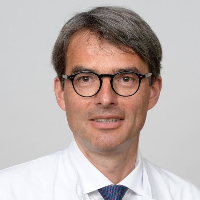






Department of General and Abdominal Surgery, Colorectal Surgery, Endocrine Surgery and Hernia Surgery
The Department of General and Abdominal Surgery, Colorectal Surgery, Endocrine Surgery and Hernia Surgery offers the full range of modern surgical interventions in the areas of its specialization. Every year, the medical facility performs more than 2,500 surgical interventions on an inpatient and outpatient basis. The department has vast clinical experience in the field of minimally invasive surgery, which allows the patient to avoid severe pain and prolonged hospitalization. In addition, the department offers robotic surgery using the most modern models of the da Vinci surgical system. The medical facility has the status of the Reference Center for Minimally Invasive Surgery and Hernia Surgery. Surgical treatment of cancer is one of the department's clinical priority focuses. A large number of da Vinci robot-assisted interventions are performed here for gastrointestinal cancers. The department holds a leading position in the use of the da Vinci surgical system in the treatment of rectal and sigmoid cancer patients. The operating rooms of the medical facility are equipped with the very latest technology, while hygiene and safety standards are at the highest level as well. Prior to surgery, the patient undergoes a comprehensive examination. Doctors also assess the risks of the upcoming operation and its expected results. With appropriate clinical indications, preference is always given to minimally invasive surgery.
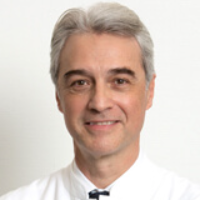
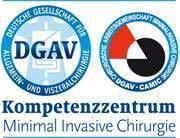
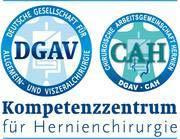




Department of General, Abdominal, Transplant, Hepatopancreatobiliary, Colorectal, Endocrine, Bariatric Surgery and Hernia Surgery
The Department of General, Abdominal, Transplant, Hepatopancreatobiliary, Colorectal, Endocrine, Bariatric Surgery and Hernia Surgery provides the full range of services in the areas of its specialization and holds a leading position at the national and international levels in terms of the number of surgical interventions performed and their success. Of particular interest are operations for treating diseases of the bowel, stomach, esophagus, pancreas, liver, gallbladder, and bile ducts, and endocrine glands. The department's doctors have excellent skills in the surgical treatment of cancer, surgery for liver, kidney, pancreas, and small intestine transplants, and operations for morbid obesity. The department's operating rooms are the pride of the medical facility, since they have all the necessary technical options for performing operations with the da Vinci surgical system, image-guided interventions, and endoscopic surgical procedures, which are characterized by minimal trauma rates.
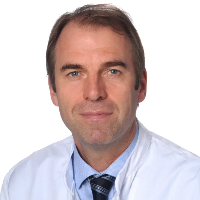




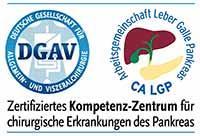
Neuroendocrine tumors (NETs) are a group of cancerous formations that can be located in different parts of the body. The most common localization of neuroendocrine tumors is the lungs and gastrointestinal tract. Neuroendocrine tumors (NETs) are neoplasms capable of synthesizing biologically active substances, the source of which is cells of the diffuse endocrine system.
Overview
Neuroendocrine tumors (NETs) develop from neuroendocrine cells that are present in various organs and systems. They produce hormones and biologically active peptides. Most neuroendocrine tumors grow slowly and do not cause any clinical symptoms for a long time. Nevertheless, there are also aggressive types of neuroendocrine tumors with significant hormonal activity. All neoplasms of this type are prone to invasion and metastasizing.
According to various statistics, NETs of the digestive system are detected with a frequency of about 12-15 patients per 1 million population. Among them, pancreatic neoplasms are found in about 70-80% of patients. The NETs of the pancreas, along with tumors of the lungs, bronchi, gastrointestinal tract, kidneys, and skin, account for less than 1% of all malignant tumors. Even multidisciplinary clinics rarely have the experience of treating a large number of patients with neuroendocrine tumors.
According to the statistics, in about 65-70% of patients functioning NETs produce one or more biologically active substances that determine the corresponding clinical picture. In most cases, patients with NETs may experience severe clinical symptoms and pathological conditions caused by the hormonal activity of these tumors, such as hypoglycemic disease, Zollinger-Ellison syndrome, Werner-Morrison syndrome, and other pathological conditions.
Besides, the development of some of these syndromes can be caused not only by a neoplasm of the pancreas but also by NETs of other localization, i.e. stomach or duodenum. In the case of a timely diagnosis making and medical treatment with radical surgery, satisfactory results of therapy (5-year survival rate) is about 80-100%, and in case of cytoreductive intervention it is about 40-60%.
Risk factors
The exact causes of the development of pathologies are unknown. However, the risk factors for the development of the disease are:
- Hereditary syndromes (multiple endocrine neoplasia types 1 and 2), Von Hippel-Lindau syndrome, type 1 neurofibromatosis)
- Patients of older age-group (the disease is rarely diagnosed in children and adolescents)
- Female patients (pathology is more common in women)
There is no data on the negative impact of diet, bad habits, and environmental factors on the development of the disease.
Types
Depending on the location, there are several types of neuroendocrine tumors including:
- Gastroenteropancreatic neuroendocrine tumors (more than half of all cases). They include neoplasms of the stomach, duodenum and small intestine, appendix, various parts of the large intestine, and pancreas.
- Bronchopulmonary neuroendocrine tumors. These are typical and atypical lung carcinoid, small cell carcinoma, large cell neuroendocrine carcinoma (about 25-30% of all cases).
- Extrapulmonary small cell carcinomas.
- Pituitary neuroendocrine tumors (located in front of this neuroendocrine gland).
- Hepatic neuroendocrine tumors.
- Pheochromocytoma.
- Neoplasms of the peripheral nervous system (schwannomas, paragangliomas, neuroblastomas).
- Genitourinary system tumors (neuroendocrine cancer and carcinoid of the urinary tract, neuroendocrine tumors of the ovaries, cervix, prostate, and testicles).
- Merkel cell carcinoma.
According to hormonal activity, neoplasms are divided into:
- Insulinomas
- Glucagonomas
- Gastrinomas
- Somatostatinomas
Most of the tumors listed above are located in the pancreas.
Stages
There are 4 stages of development of neuroendocrine tumors:
- Stage 1. Stage 1 of neuroendocrine cancer includes primary neuroendocrine tumor up to 2 cm in diameter; lymph nodes are not affected.
- Stage 2. At the second stage, the size of the formation exceeds 2 cm, but the neoplasm does not spread to other tissues or lymph nodes. At the advanced second stage, the process involves nearby connective tissues, muscles, cartilage, and bones without affecting the lymph nodes.
- Stage 3. At the third stage, the neuroendocrine tumor spreads to lymph nodes, adjacent cartilage, bones, muscles, connective tissues.
- Stage 4. At the fourth stage, metastases from the tumor are found in the liver, lungs, brain, and bones.
Symptoms
The symptoms that patients with neuroendocrine tumors may experience depend, first of all, on the type of hormones produced by the tumor. Most often, with the serotonin production, patients experience:
- Hot flashes
- Telangiectasia (a condition in which widened venules cause red lines on the skin)
- Shortness of breath, wheezing, and cough associated with bronchospasm
- Diarrhea
- Weight gain
- Tachycardia
- Heart murmurs (produced when blood is pumped across a heart valve and creates a sound loud enough to be heard with a stethoscope)
- Arterial hypertension or low blood pressure
- Fibrous changes in the endocardium
- Signs of stagnation in the pulmonary circulation (cough, shortness of breath, pulmonary edema)
In stressful situations, after anesthesia or surgery, a carcinoid crisis may develop. It is caused by a release of serotonin. It is manifested by sudden changes in the blood pressure, tachycardia, severe diarrhea, and pronounced redness of the face. The condition is a medical emergency. With insulinoma, the following symptoms can manifest:
- Tremor
- Convulsions
- Nervousness
- Weakness
- Sweating
- Dizziness
- Fainting
- In severe cases, coma
Diagnostics
The treatment of neuroendocrine tumors (NETs) in the form of radical operations can only be performed after the diagnosis confirmation.
Laboratory diagnosis making begins with general clinical tests. Further diagnosis making includes determining the levels of hormones and their metabolites.
Many neuroendocrine tumors are very small and it is really difficult to identify their location.
In European hospitals, patients with suspected neuroendocrine tumor undergo:
- Endoscopic examination of the gastrointestinal tract. If suspicious formations are detected, a biopsy is taken for histological examination.
- Abdominal ultrasound scanning.
- Chest X-ray.
- CT scan or MRI of various parts of the body (special contrast agents are used).
- Positron emission tomography (PET) with isotope-labeled glucose for identification of the smallest fast-growing tumor foci.
Treatment
Resection is a surgery that completely removes the neuroendocrine tumor along with some healthy nearby tissues. Resection is the main medical treatment for most NETs that haven’t metastasized yet.
Surgery resection of NETs implies either the removal of the neoplasm itself and a border of healthy tissues around it or, in the case of serious damage, the radical surgery resection of the entire organ. Often, nearby lymph nodes are also excised. In most cases, surgery resection of neuroendocrine tumors has a favorable prognosis.
Before surgery resection, patients undergo the following tests in order to confirm the diagnosis:
- Clinical and biochemical blood tests
- Assessment of the function of the liver and kidneys
- Tumor markers blood level
- Coagulation tests
- Testing for syphilis, HIV, hepatitis B and C
- Determination of blood type and Rh-factor
- Urine tests
- Serotonin blood levels
- Urine analysis for metabolites (5-HIAA)
- Assessment of the concentration of gastrointestinal and pancreatic hormones that may be produced by tumor cells (e.g. somatostatin, insulin, vasoactive intestinal peptide, glucagon, gastrin)
- Biopsy of a suspicious area with further histological examination of the obtained material
During surgery resection for the treatment of patients with NETs, it is extremely important to be sure that all malignant cells have been removed. For this, a tissue that is affected by a tumor is removed and sent to a laboratory for express analysis. There, a specialist examines the edges of the tissue under a microscope. If the surgery resection is successful, only healthy cells should remain. This means that the neuroendocrine tumor of the lung, stomach, intestine, pancreas, or other organ has been removed completely.
In patients with advanced stages of tumor development, a surgery resection may be considered ineffective or unsuitable. In this case, cytoreductive intervention is sometimes performed in European hospitals. The purpose of such surgery is to minimize the volume of tumor tissue in the patient’s body. Further, radiation therapy and modern schemes of specific pharmacological drugs (including targeted therapy and immunotherapy) administration are considered possible additional or reserved therapeutic techniques for patients with NETs.
Among the minimally invasive operations, it is worth noting radiofrequency ablation and embolization of the arteries that feed the neoplasm. Such interventions demonstrate the best results in patients with neuroendocrine liver tumors.
After surgery resection of a neuroendocrine tumor, the patients stay under the supervision of doctors. The duration of stay (from 1 to 14 days) depends on the extent of the operation and the presence or absence of postoperative complications in patients.
The prognosis of the treatment is largely determined by the organ in which the neoplasm was detected, as well as by the stage of tumor development and the time of treatment start. If the spread of malignant cells has not begun yet, and the surgery resection was performed on time, then, according to statistics, a 5-year survival rate is about 92%. The age of patients and the general state of health also play a role in determining the prognosis.
After discharge from the hospital, the patients should undergo follow-up examinations. Patients must have consultations with an oncologist every 3 months during the first two years after the operation, and once every six months thereafter.
Side effects can develop with any type of treatment for NETs, but everyone’s experience is individual. Some patients have multiple side effects; other patients have only a few side effects.
Side effects can develop any time during, i.e. immediately after, or a few days or weeks after the surgery. Sometimes late side effects develop months or years after surgery. Most side effects will go away on their own or can be treated with symptomatic medicines, but some may last a long time or become permanent.
Side effects of surgery for NETs treatment will depend mainly on the type of surgery, resection area, and patient’s overall health condition.
Where can I undergo treatment with surgery resection abroad?
Health tourism is becoming more and more popular these days, as medicine abroad often ensures a much better quality of medical treatment of NETs with surgery resection.
The following European hospitals show the best success rates in medical treatment of NETs with surgery resection:
- Academic Hospital Brothers of Mercy Munich, Germany
- Memorial Sisli Hospital Istanbul, Turkey
- University Hospital of Ludwig Maximilian University of Munich, Germany
- Charite University Hospital Berlin, Germany
- University Hospital Ulm, Germany
You can find more information about the European hospitals on the Booking Health website.
The cost of treatment with surgery resection
The prices in European hospitals on the Booking Health website are relatively low. With Booking Health, you can undergo medical treatment with surgery resection at an affordable price.
The cost of treatment varies, as the price depends on the hospital, the specifics of the disease, and the complexity of its treatment.
The cost of treatment with surgery resection in Germany is 18,602-30,583 EUR.
The cost of treatment with surgery resection in Turkey is 12,424-15,466 EUR.
You might want to consider the cost of possible additional procedures and follow-up care. Therefore, the ultimate cost of treatment may differ from the initial price.
To make sure that the overall cost of treatment is suitable for you, contact us by leaving the request on the Booking Health website.
How can I undergo treatment with surgery resection abroad?
It is not easy to self-organize any treatment abroad. It requires certain knowledge about the foreing healthcare systems. Thus, it is safer, easier, and less stressful to use the services of a medical tourism agency.
As the largest and most transparent medical tourism agency in the world, Booking Health has up-to-date information about the treatment with surgery resection in the best European hospitals. We will help you select the right clinic taking into account your wishes for treatment.
We want to help you and take on all the troubles. You can be free of unnecessary stress, while Booking Health takes care of all organizational issues regarding medical treatment. Our services are aimed at undergoing treatment with surgery resection safely and successfully.
Medical tourism can be easy! All you need to do is to leave a request on the Booking Health website, and our manager will contact you shortly.

